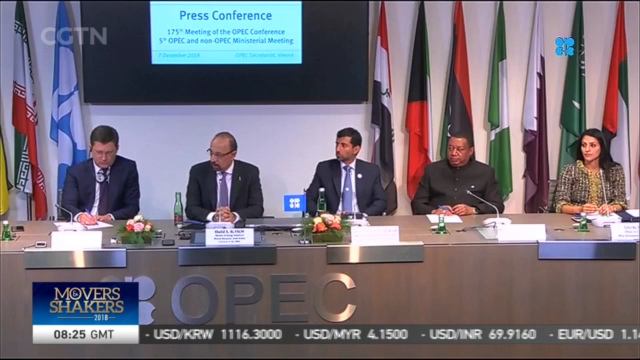
16:54, 31-Dec-2018
Global Oil: A host of market game-changers in 2018
Updated
15:38, 03-Jan-2019
02:37

From American sanctions on Iran to concerns of oversupply, 2018 saw some major changes in the world's oil markets. Rosanna Lockwood reports from Dubai on what impact the changes had.
The year began with Iranian oil being widely traded, but it's ending with Tehran's energy exports feeling the heat from U.S. sanctions. Uncertainty dominated the markets ahead of those restrictions being enforced in November. But it hasn't drawn the type of price spike many analysts predicted, instead oversupply now appears to be the word of the day. The gamechanger for global markets in 2018 might be US production.
RICHARD JOSWICK, MANAGING DIRECTOR OIL ANALYTICS, S&P GLOBAL PLATTS "We've seen how US crude exports two years ago was half a million barrels per day, then a million, a million and a half, 2 million, the latest weekly numbers were over three million, I don't know if that's sustainable yet, but it really has an effect on global markets."
Meanwhile, OPEC has been forced to react to a changing landscape.
ROSANNA LOCKWOOD DUBAI "The Middle East's politics has left its mark on OPEC in 2018, notably an ongoing spat involving Saudi Arabia and its regional allies such as the UAE, pitted against Qatar. It's spilt into OPEC unity, with Doha recently making the decision to leave the organisation in 2019."
Given Qatar is a LNG powerhouse, analysts doubt it will massively impact OPEC's oil capacity. But major changes do appear to be afoot. A recent decision by the organisation to reduce supply highlighting a shifting dynamic.
ROBIN MILLS, CEO QAMAR ENERGY "Well I think the Saudi Russia axis has become very important in terms of managing supply, yes Russia has been which its never really been before an active player in collaborating on supply decisions and cutting supply, not cutting as much as the main OPEC countries, but still cutting and that was really crucial of course in making sure that OPEC could actually deliver these cuts and there are a lot of members including Saudi Arabia who didn't want to even come into cuts unless they could be sure they wouldn't be losing market share to Russia and some of the other non-OPEC countries."
Another supply factor set to seep into 2019 concerns waivers granted by Washington to some importers of Iranian crude. On paper they're supposed to be temporary, with the US looking to further restrict Iran's energy output. Add to the equation slowing global economic growth and an unresolved trade spat between China and the US. Some of the headwinds moving commodity markets this year look set to leave their mark on 2019. Rosanna Lockwood, CGTN, in Dubai.

SITEMAP
Copyright © 2018 CGTN. Beijing ICP prepared NO.16065310-3
Copyright © 2018 CGTN. Beijing ICP prepared NO.16065310-3